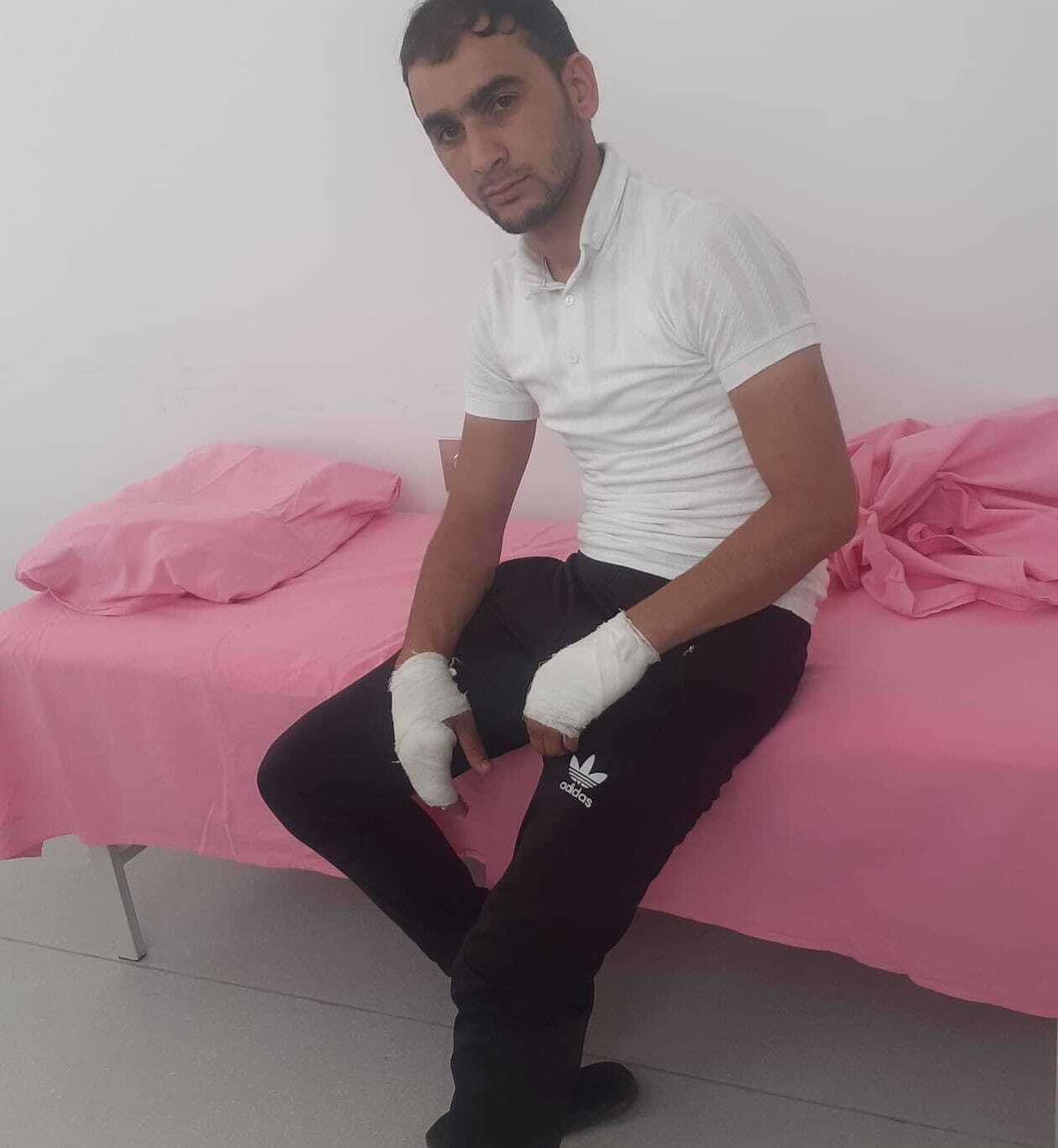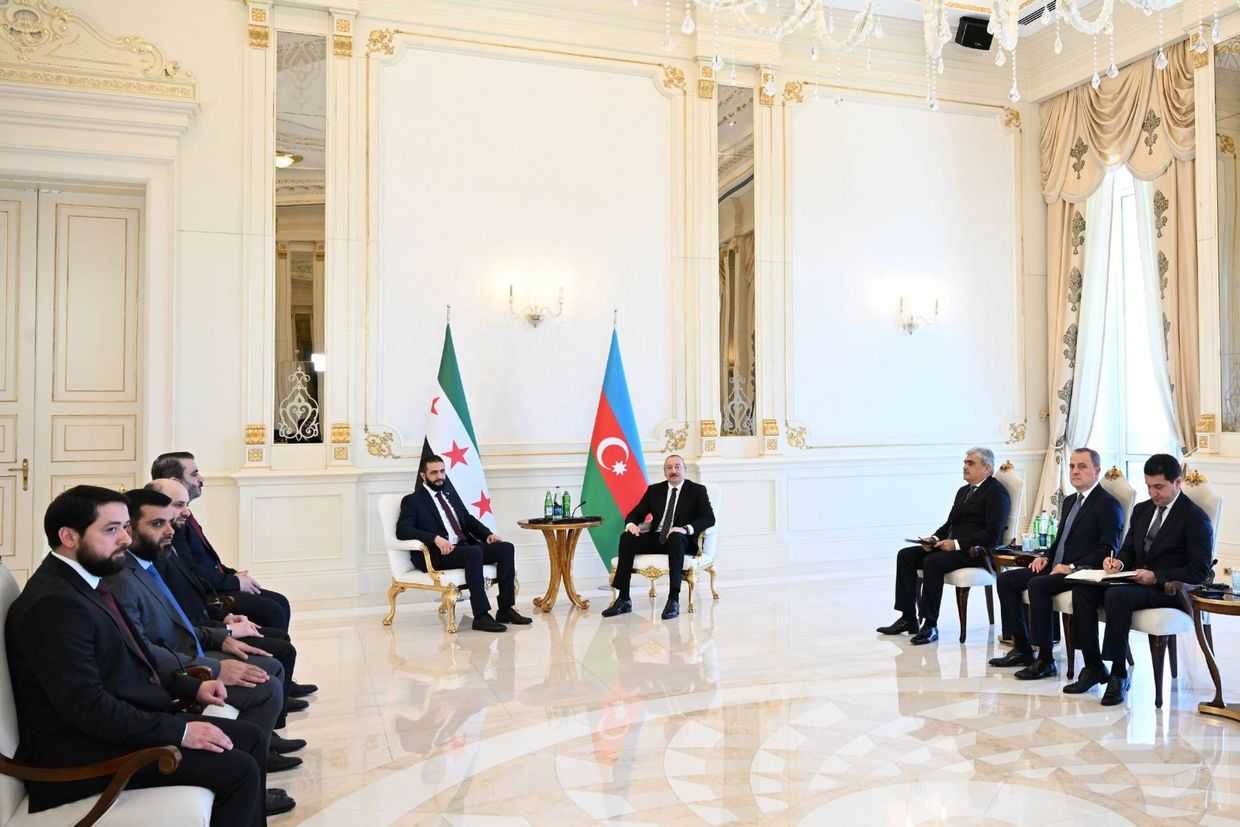
A wave of suicides among Azerbaijani veterans of the Second Nagorno-Karabakh War has led experts to question whether the government is doing enough to rehabilitate those who fight in its service.
On 4 July, Ilham Hasanov, a veteran of the Second Nagorno-Karabakh War, visited a petrol station in Shamkir, a city in northwest Azerbaijan, where he purchased a container of petrol.
He then drove to the offices of the local district authorities and attempted to set himself alight.
Hasanov survived; onlookers stopped him in the nick of time, and he only sustained burn injuries to his hands, but images of his self-immolation attempt added fuel to a growing anger in Azerbaijan at the treatment of war veterans.

Before attempting suicide on 4 July, Hasanov had gone to the Shamkir District Executive Authority to talk about his combat injuries, only to be directed to a foundation dedicated to disabled war veterans, the Yashat Foundation, where there was no one to meet him.
During the war, Hasanov suffered a serious head injury, and still has shrapnel lodged in his neck, near the carotid artery. Because removing it is a risky procedure, no hospital has agreed to excise it. Despite this injury, authorities refuse to give him veteran disability status.
Now, he feels the state he fought for has left him behind.
Hasanov receives ₼80 ($47) per month as a veteran of the war, but he has received no compensation or support for the debilitating effects his injuries have had on him. ‘I can’t do anything with ₼80’, he told OC Media.
‘I don’t want to live, because there is no hope’, Hasanov says.
Hasanov’s case is unfortunately not unique; since the end of the war, over 50 veterans have attempted suicide, 42 of whom died.
When corruption gets in the way of rehabilitation
On 2 June, a group of veterans of the Second Nagorno-Karabakh War rallied in front of the Ministry of Labour and Social Protection to protest the revocation of their veteran disability status — and with it guaranteed access to social benefits and appropriate pensions.
When asked about the current criteria used to evaluate whether a veteran is eligible for disability status, the Ministry of Labour and Social Protection told OC Media that ‘not every injury qualifies as a disability’.
The ministry explained that its assessment of injuries sustained by veterans during fighting is ‘comprehensive’; it uses a system to categorise injuries based on their severity, while constantly expanding its criteria for what qualifies as a disability.
On 1 August, the ministry claimed to have reassessed the conditions of all the veterans of the Second-Nagorno Karabakh War. It claimed that 3,151 of the veterans had recovered from their injuries, and so had lost their disabled status.
However, Hafiz Hasanov, an independent lawyer from Baku, claims that thousands more have lost disability benefits after being accused of falsifying their documents.
‘In the last three years, these problems have become acute’, Hasanov told OC Media. ‘If we look at the official figures announced as a whole, we see how many times disabled status has been revoked and how many people’s benefits have been cut’.
This, Hasanov argues, could be an indicator of corruption on a larger scale, one the state is fully aware of.
In addition, Hasanov was critical of the centralised nature of these assessments; he concludes that whether veteran retains their disability status or not ultimately depends on the decision of an agency in Baku.
‘Evaluation is done by the doctor’s advisory commission. After the preliminary examination, the results obtained by the doctor’s advisory commission are sent to the State Medical Social Expertise and Rehabilitation Agency, where it is decided whether the case meets the disability criteria’, he explained.
‘Recent events have shown that the human factor is the most important factor in assessing the real situation for the determination of disability.’
‘Azerbaijan was only interested in war’
Following the 44-Day War, Azerbaijan has implemented several rehabilitation programmes, often directly sponsored by President Ilham Aliyev. The Ministry of Labour has told OC Media that up to 5,000 families were provided with social and psychological rehabilitation services, while 2,506 individual citizens were provided with rehabilitation services.
Azerbaijan’s Ministry of Emergency Situations has been one of the most active state bodies involved in the rehabilitation of people affected by war, bringing in psychologists and counsellors from Turkey as part of a programme to support individuals who participated in the war as well as the nearly 1,000 families living in regions near the line of contact.
[Read more about Azerbaijan’s effort to rehabilitate people affected by war on OC Media: Invisible scars: Children, war, and mental health in Azerbaijan]
‘This initiative lasted about two months’, said Sanubar Heydarova, an independent social worker based in Baku. She said that the programme was riddled with issues, including language barriers and what she described as neglectful and superficial approaches to rehabilitation. She said that beneficiaries were given two or three sessions at most, and no tangible results were achieved.
‘It takes many years to work with veterans’, she explained. ‘Extensive and organised work should be done to rehabilitate people from the traumas they received.’
‘It would be illogical to expect any results.’
‘Just as the Azerbaijani government was not interested in the evacuation of the civilian population during the war, it was also not interested in the social security provided to the war participants and their families after the war.’
‘In other words’, she said, ‘Azerbaijan was interested in war’.
Aggression without an outlet
Clinics and health centres dedicated to people affected by war remain one of the most important sources of support for veterans, especially in the regions.
However, Heydarova claims that these centres are not only underfunded but also barely get any real work done.
She recalled walking by the entrance of a mental health centre dedicated to veterans in one of the regions, where she saw a sign that read that their support hotline was only active until 16:00.
‘This means that if someone is planning to commit suicide, they must do so by 16:00 — otherwise, no agency will be interested. Such a ridiculous situation’, she exclaimed.
Ray Karimoghlu, chair of the Karabakh Veterans Union, disagrees.
He believes these centres already have the funds they need, and that veterans are afforded the attention of Aliyev and his Vice President and wife, Mehriban Aliyeva. In his opinion, the problem lies within the centralised nature of the rehabilitation programme, which often disregards people living in the regions.
‘There is no shortage of funds to address their concerns, they are instructed to do whatever is necessary’, he told OC Media. ‘These issues simply cannot be fully conveyed to the villages. The relevant executive bodies of the state cannot perform this work properly. This is the root of the problem’.
He pointed out that nearly 14,000 families who lost soldiers to the war were provided with housing, while 7,000 veterans and other people who were maimed by the fighting received prosthetics.
The Ministry of Labour and Social Protection has told OC Media that the Azerbaijani government has offered a comprehensive social support package covering up to 100,000 people affected by the war — primarily war veterans and their families.
The package covered housing, provided vehicles to disabled veterans, and even created prospects of self-employment for up to 8,000 people. The government has also provided jobs for around 5,400 people.
However, Karimoghlu believes that it is also necessary to establish an independent investigative commission to look into the latest wave of veteran suicides since the end of the war.
‘Who pushed them to commit suicide? The guilty must be punished’, he stressed.
Veteran suicide is not an uncommon phenomenon; in 2019, a study by the United States Department for Veteran Affairs revealed that the suicide rate for veterans was 1.5 times the rate of other adults in the general population.
However, Azad Isazada, a military psychologist, says that in Azerbaijan, the challenges of PTSD and physical trauma are often further exacerbated when veterans are unable to acquire the medical and professional attention that they need.
‘It goes without saying that a person’s aggression increases when he is in a fight; it is impossible to wage a war without aggression’, he said.
Isazade argues that after war, veterans struggle to reintegrate into society due to the patterns of aggression they were subjected to, which eventually manifests into aggression in everyday life, often towards oneself.
‘This is what we call auto-aggression’, explained the psychologist, saying that veterans may eventually resort to self-harm if they are unable to find their place in society again.
Isazada notes that aggression can also manifest outwardly towards those nearest to them; a veteran scarred by war could eventually be annoyed by the smallest of things, or irked by his own children and wife. Domestic abuse could become an outlet for their trauma.
Or, Isazada believes, it could instead manifest in self-harm.
‘A person experiencing auto-aggression can commit suicide and inflict harm on himself. This is the visible side. Suicide cases appear in the press, and we often hear and see this news. But we cannot estimate how much aggression occurs within the family, or against family members’.
He believes that all veterans of the Second Nagorno-Karabakh War should go through psychological rehabilitation programmes, even if they do not exhibit any mental or physical trauma.
However, he echoed the same concerns as the Karabakh Veterans Union about the centralisation of rehabilitation efforts.
‘In big cities, it is possible to get psychological help, but many of our veterans live in regional centres and villages’, he said. ‘They do not know where to turn [for help]’.
‘I think that every district should have rehabilitation centres. It should be in every district, not even just regionally’, he argued, adding that these centres should be fully holistic, with lawyers, sociologists, and medical professionals on their payrolls to prevent instances of centres turning away veterans who seek help.
‘Unfortunately, I often hear from the veterans who turn to me that they just listen to them a little, say that this problem cannot be solved, send them to a different place, send them from one office to another and make this person helpless.’






